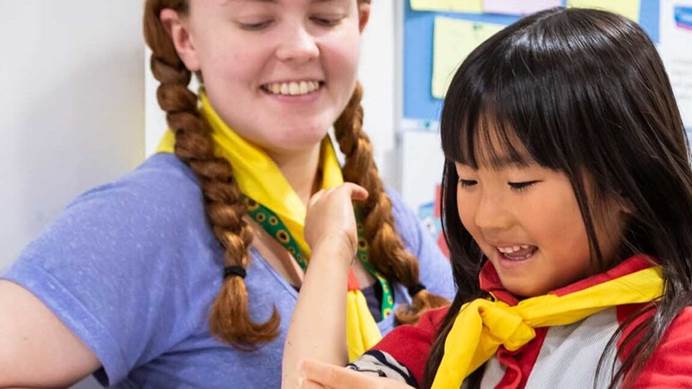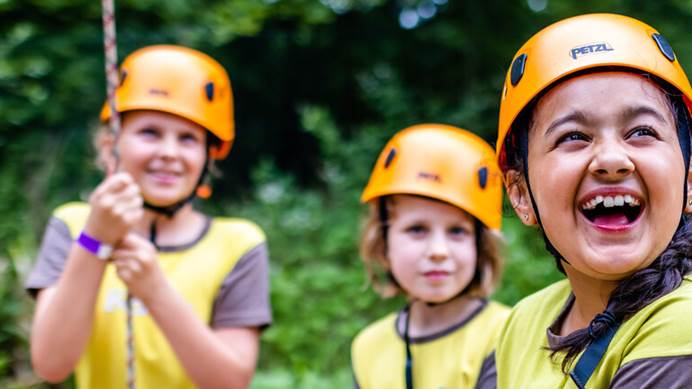Digital safeguarding policy
How to use the internet - including social media - safely
Approved: 30 September 2023
Version: 3
Digital safeguarding is how we help everyone at Girlguiding stay safe online.
This policy explains our approach to staying safe online, and what we expect of our volunteers and staff.
It’s important you follow this policy and its procedure. You must read them alongside our Safeguarding policy and procedure.
If you have a safeguarding concern – offline or online – you must report it.
What do we mean by digital safeguarding?
We’re committed to safeguarding everyone in Girlguiding. This includes people who use our digital services and social media channels.
We follow the same safeguarding principles for Girlguiding’s activities offline and online. This policy relates closely to our Safeguarding policy and Managing information policy.
Digital safeguarding means protecting everyone at Girlguiding from online harms like:
- Cyberstalking – Repeatedly using electronic communications to harass or frighten someone. For example, by sending threatening messages.
- Discrimination and abuse on the grounds of protected characteristics – It can be an offence to stir up hatred – 'inciting hatred' - on the grounds of any of the protected characteristics.
- Disinformation - Deliberate intent to spread wrong information.
- Hacking – Accessing or using computer systems or networks without authorisation, often by exploiting weaknesses in security.
- Harmful online challenges – Online challenges sometimes show people doing dangerous things. People share these posts on social media, encouraging others to do the same.
- Hoaxes – A lie designed to seem truthful.
- Impersonation - Where someone pretends to be someone else online. This is often by taking photos from social media to build a fake profile. This is sometimes known as ‘catfishing’.
- Misinformation - Where someone shares information they think is correct, but it isn’t.
- Online bullying - Offensive, intimidating, malicious, insulting behaviour and abuse of power online. This can humiliate or denigrate people.
- Online harassment - Unwanted contact online intended to violate someone’s dignity. It could be hostile, degrading, humiliating or offensive.
- Promotion of self-harm, suicide and eating disorders – Content encouraging these harmful behaviours on social media.
- Radicalisation - Radicalisation aims to inspire new recruits, embed extreme views and persuade vulnerable people to support a cause. This may be through a direct relationship, or through social media.
- Sexual exploitation and grooming online - Developing a relationship with a child with the intention of abusing them. Offenders use emotional and psychological tricks to build relationships. The abuse can take place online or offline.
- Sharing of illegal and inappropriate imagery - ‘Illegal’ means child sexual abuse imagery and imagery that incites violence, hate or terrorism. ‘Inappropriate’ could mean sharing pornography, or violent or hateful content.
- Oversharing personal information - This includes information that makes someone identifiable, like their names or phone number. It may also include identifying details based on someone’s protected characteristics.
If you think someone is at risk of any of these harms, you must report it.
This policy applies to all Girlguiding volunteers, members and HQ staff. This includes employees, officers, consultants, contractors, interns, casual workers and agency workers.
It also applies to everyone who uses our online services. These include websites, digital platforms and social media. It applies in the UK and for British Girlguiding Overseas (BGO).
It covers all Girlguiding activities at any level which take place online. These include:
- Any activities that take place over internet Girlguiding provides
- Any Girlguiding activities that take place on non-Girlguiding affiliated digital platforms, like Facebook or Zoom, or devices, like mobile phones or computers.
Digital safeguarding is everyone’s responsibility
We expect all Girlguiding members, volunteers and staff to:
- Always report a safeguarding concern, offline or online, even if you aren’t sure. Girlguiding’s HQ Safeguarding team is here to help.
- Follow this policy and procedure, alongside our Safeguarding policy and procedure.
- Recognise the types of online harms and the risks they have.
- Make every effort to ensure girls and young members understand why and how to stay safe online.
- Make sure you have the correct permissions in place before taking and using photographs.
- Delete photos after events, in line with our Managing information procedure.
- Never contact a girl or young member under 14 without permission from their parent or carer. This applies even if they contacted you first, unless it's an emergency.
- Follow Girlguiding’s Code of Conduct online as you would offline.
- Make sure you set up and use social media accounts responsibly. See our Digital safeguarding procedure for more information.
- Make sure you do everything possible to stop access to illegal or inappropriate content on Girlguiding devices or devices used for Girlguiding activities. For example, using parental controls.
Girlguiding’s commitment to digital safeguarding
- Our HQ Safeguarding team is on hand to support you with any concerns you might have. If you think someone might be at risk of harm, offline or online, you must report it.
- We make sure our projects, activities, programmes and campaigns support all of our members, volunteers and staff to stay safe online.
- We aim to incorporate best practice in digital safeguarding in everything we do.
- We help our volunteers to support members in being effective online.
- We take action in line with best practice when a digital safeguarding incident happens.
- We support and train volunteers and staff in digital safeguarding.
- We keep links with key organisations to raise awareness and refer and report incidents.
- We risk-assess all our projects, initiatives, programmes, activities, services and campaigns to make sure digital safeguards are in place.
- We support volunteers and staff using our safeguarding structure.
Staying safe is our priority but we can’t resolve every issue. Some may be the service provider or user’s responsibility.
Who’s responsible for digital safeguarding at Girlguiding?
Our Safe practice department leads digital safeguarding at Girlguiding. This includes our HQ Safeguarding team. They make sure we’re obeying the law and using best practice. They also work with our Digital team on safeguarding.
If you know of an allegation, concern or disclosure, you must report it.
You must deal with online incidents in the same way as other safeguarding incidents. This could be something that happens at a unit meeting, or a member raising an issue at an online meeting.
The HQ Safeguarding team are on hand to support you. You can contact them at [email protected].
Girlguiding will only share information with other agencies when necessary. This could be if there’s a significant concern, or where someone may have committed a crime.
If a volunteer breaches this policy, we’ll manage it using our Managing concerns about adult volunteers policy.
For staff, we’ll use our staff disciplinary procedure, which is on the staff intranet.
BGO countries must abide by local legislation when applying this policy, where relevant.



